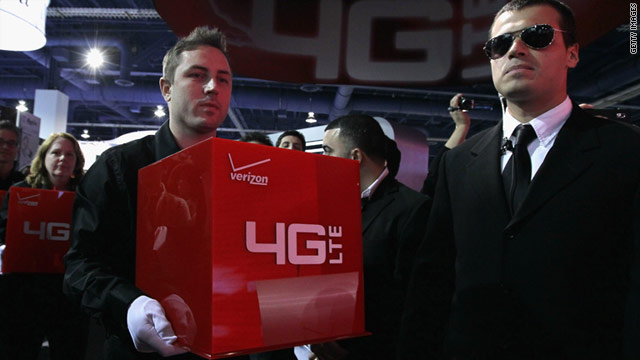
Access to faster 4G networks can make tethering a more enjoyable experience.
Editor's note: Amy Gahran writes about mobile tech for CNN.com. She is a San Francisco Bay Area writer and media consultant whose blog, Contentious.com, explores how people communicate in the online age.
(CNN) -- Recently AT&T and Verizon both announced that they're cracking down on users who skirt their monthly add-on fees to "tether" -- which means they use their phones' connection to link laptops and other gadgets to the Internet.
But some mobile experts say carriers' tethering charges are a sham -- especially since there are methods to avoid these charges.
Once the sole domain of dedicated geeks, tethering has become more popular in the last couple of years. Tethering your laptop to your phone offers more privacy and security than connecting to an open Wi-Fi network. Also, in locations that lack accessible Wi-Fi, tethering may be your only option for getting online.
With the advent of smartphones, mobile apps have made tethering fairly simple to accomplish. Also, as carriers' so-called "4G" wireless broadband networks get deployed more widely, access to faster networks can make tethering a more enjoyable experience -- sometimes even outpacing speeds available via "wired" cable modem or DSL connections.
Last week, Boy Genius Report confirmed that AT&T will soon begin revoking its unlimited data plans for customers who use apps on jailbroken iPhones to tether.
Similarly, last week Read Write Web reported that Verizon has begun blocking tethering for customers using jailbroken phones without data plans: "A ReadWriteWeb employee using a jailbroken tethered Verizon Motorola X without a data plan was sent to this page outlining Verizon's hotspot data plans today when trying to access a hotspot."
This week, Broadband Reports notes that Verizon denies changing their tethering fee enforcement policies. But reportedly in June, Verizon tried to push an update to some Droid X phones that targeted a specific tethering app. Users quickly found a workaround.
Why do carriers charge extra for tethering?
Mobile users who tether are likely to use far more data across carrier networks. This alone should make wireless carriers happy since they sell "tiered" data plans that charge users according to how much data they consume.
Meanwhile, the major U.S. carriers are phasing out "unlimited" plans -- and using throttling to make grandfathered-in unlimited plans unattractive to high-volume mobile data consumers.
But carriers have realized that they can rake in even more money by taking steps to control your phone's ability to tether, and then selling tethering as an "extra" service -- in addition to charging you for a data plan.
The advocacy group Free Press doesn't think this is fair. In June it filed a complaint urging the Federal Communications Commission to prohibit Verizon from banning 4G tethering.
Right now, AT&T charges users an extra $20 per month to be able to tether with permission from the network. Verizon's authorized tethering plan is its Mobile Broadband Connect service, starting at $30 per month. T-Mobile and Sprint offer similar tethering plans. Also, Sprint recently disabled free tethering on the Nexus S 4G.
What if you want to tether but don't want to pay extra fees?
There is an option: Get an unlocked, unbranded smartphone that uses GSM cell network technology. This costs more upfront and takes some extra work to implement, but it provides more flexibility -- and in the long run it may save you money.
How to avoid tethering fees with an unlocked phone
Myriam Joire, senior editor for mobile at Engadget.com, explained in the July 30 and August 6 episodes of the Engadget Mobile Podcast why she believes tethering fees are "a sham."
She also recently sat down with me to explain in detail how to get an unlocked phone and use it to avoid tethering fees.
"If you've signed up for a data plan, why should you have to pay for tethering?" Joire asked.
She offered this analogy: "Imagine that you're shopping for a truck. Ford will let you have one, but you can only buy gas from Ford gas stations, and you can only drive on Ford roads. But wait -- you'd get that truck for free. It's a matter of choice: Some people want the free truck, some people want freedom. That approach may sound outrageous for cars, but we do it all the time with mobile -- pay $50 for a phone that costs $600 and sign an expensive two-year contract."
If you're willing to pay a few hundred dollars more upfront, you can purchase an unsubsidized phone that is both unlocked (not technologically bound to a particular carrier's network), and unbranded (not using carrier-supplied "firmware").
This strategy can give you more flexibility to use a smartphone with the kind of carrier contract you want -- or a no-contract month-to-month plan. It also makes it possible to tether for free. It doesn't completely eliminate the chance of getting caught by the carrier, but it does substantially reduce this risk.
If they take care not to consume vast amounts of data conspicuously, owners of unlocked phones probably won't get caught, Joire said.
In this article, Joire explains how U.S. consumers can get an unlocked phone and use it to avoid tethering fees
The opinions expressed in this post are solely those of Amy Gahran.
No comments:
Post a Comment